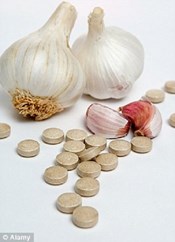My grandmother, a health food fanatic long before it was popular, frequently munched on raw garlic “for medicinal purposes.” So I wasn’t surprised to see the results of a recent systematic review on the potential virtues of eating garlic to lower blood pressure. My grandmother’s seemingly quirky behavior may prove to be healthy ones after all. High blood pressure is clearly something to avoid given its link to heart disease and stroke. And it affects a lot of people: according to the American Heart Association, one out of every three adults has high blood pressure. Could garlic be the answer?
The review evaluated the findings from 21 studies and meta-analyses. It found that supplements of dried garlic, such as Kwai, containing the active ingredient allicin consistently led to reductions in blood pressure. However not all garlic products produce this effect. The review found that fresh cloves, extracts, and oils aren’t as beneficial.
The critical element for lowering blood pressure appears to be the release of allicin, which is produced when raw garlic is crushed but mostly destroyed during the cooking process. Without the presence of allicin, at a dose of 1.8 milligrams, garlic is unlikely to lower blood pressure. This work builds on previous research which suggests that garlic with an allicin yield like Kwai also helps lower LDL cholesterol and triglycerides – both of which are linked to coronary heart disease.
The take away message seems pretty clear. One fairly easy way of preventing a stroke and heart attack is to eat daily tablets of garlic. Not only might you avoid hypertension, but your breath will remain sweet and fresh – a challenge to lovers of raw garlic.







